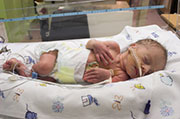- 10 Strategies to Overcome Insomnia
- Could Artificial Sweeteners Be Aging the Brain Faster?
- Techniques for Soothing Your Nervous System
- Does the Water in Your House Smell Funny? Here’s Why
- Can a Daily Dose of Apple Cider Vinegar Actually Aid Weight Loss?
- 6 Health Beverages That Can Actually Spike Your Blood Sugar
- Treatment Options for Social Anxiety Disorder
- Understanding the Connection Between Anxiety and Depression
- How Daily Prunes Can Influence Cholesterol and Inflammation
- When to Take B12 for Better Absorption and Energy
Parents’ Clothing Can Infect Newborns in Intensive Care


The clothing of parents and visitors may spread dangerous respiratory infections to infants in an neonatal intensive care unit (NICU), a Australian study suggests.
Four percent of swabs taken from the personal clothing of caregivers and visitors in the NICU at Royal Hospital for Women in Sydney had detectable respiratory syncytial virus (RSV), researchers found. RSV is the leading cause of respiratory-related hospitalizations among premature babies, the researchers said.
The investigators also found RSV on 9 percent of high-touch areas in the NICU, including nurses’ computers, chairs next to infants’ beds and bed rails. RSV was not detected on the hands of doctors, nurses or visitors in the NICU.
“Though the detection rate is low, personal clothing of caregivers/visitors do get contaminated with RSV,” study author Nusrat Homaira, of the University of New South Wales, said in an American Society for Microbiology news release.
Currently, caregivers and visitors aren’t required to change their clothes when they enter the neonatal intensive care unit, the researchers said.
“There is a need for further research to evaluate how long the virus remains infectious on personal clothing, which will have policy implications in terms of need for use of separate gowns by the visitors while they are in the NICU,” Homaira said.
The study was presented Monday at the International Conference on Emerging and Infectious Diseases, in Atlanta. Studies presented at meetings should be considered preliminary until published in a peer-reviewed medical journal.
More information
The U.S. National Institute of Allergy and Infectious Diseases has more about RSV.
Source: HealthDay
Copyright © 2026 HealthDay. All rights reserved.










